9 start with D start with D

A peculiar necrophilia dominates literary theory. Whether it be under the banner of “anatomy of criticism” or “death of the author,” students of literature seem fated to form a “Dead Poets’ Society.” Can literature ever create or sustain life? What is the cultural mythology of the “dead poet”? In a broad-ranging analysis of modern French and Russian writing—from poems, plays, and essays to revolutionary marches, fashion magazines, and suicide notes—Svetlana Boym reconsiders the making and unmaking of the self in writing on life.
Examining both literal and figurative deaths of poets, the author elaborates alternative strategies for reading text, life, and culture all together. Boym questions the traditional boundaries between literary theory, social psychology, anthropology, and history. She draws on and yet resists ideas advanced by Russian formalists and French and American poststructuralists to develop an authoritative critical vocabulary for the purpose of analyzing modern poetic myths. She brings poets back to life, back to their lives once again, and thereby resuscitates the dying art, the art of dying in words. The result is cultural criticism of a very high order.
The book offers spectacular example of poetic lives. First the author considers the legend of the “pure poet,” focusing on the opposite paths of Mallarmé and Rimbaud. The she investigates the myth of the “revolutionary poet,” stressing the tension between poetry and politics, particularly in the life and work of Mayakovsky. In a third section, she explores the masking image of “poetess” and its fatal entrapment of the woman poet—here, Marina Tsvetaeva. In “The Death of a Critic?” she brings the study to brilliant conclusion, revealing the ironies inherent in the work of Barthes, de Man, and Foucault, the three critics who celebrated the death of the author and yet who, in their own deaths, are subject to biographical speculation.

Romantic writers had found in Christianity a poetic cult of the imagination, an assertion of the spiritual quality of beauty in an age of vulgar materialism. The decadents, a diverse movement of writers, were the climax and exhaustion of this romantic tradition. In their art, they enacted the romance of faith as a protest against the dreariness of modern life. Ellis Hanson teases out two strands--eroticism and aestheticism--that rendered the decadent interest in Catholicism extraordinary. More than any other literary movement, the decadents explored the powerful historical relationship between homoeroticism and Roman Catholicism. Why, throughout history, have so many homosexuals been attracted to Catholic institutions that vociferously condemn homosexuality? This perplexing question is pursued in this elegant and innovative book.
Late-nineteenth-century aesthetes found in the Church a peculiar language that gave them a means of artistic and sexual expression. The brilliant cast of characters that parades through this book includes Oscar Wilde, Charles Baudelaire, J.-K. Huysmans, Walter Pater, and Paul Verlaine. Art for these writers was a mystical and erotic experience. In decadent Catholicism we can glimpse the beginnings of a postmodern valorization of perversity and performativity. Catholicism offered both the hysterical symptom and the last hope for paganism amid the dullness of Victorian puritanism and bourgeois materialism.
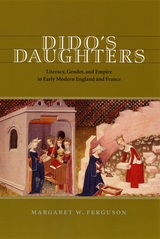
Our common definition of literacy is the ability to read and write in one language. But as Margaret Ferguson reveals in Dido's Daughters, this description is inadequate, because it fails to help us understand heated conflicts over literacy during the emergence of print culture. The fifteenth through seventeenth centuries, she shows, were a contentious era of transition from Latin and other clerical modes of literacy toward more vernacular forms of speech and writing.
Fegurson's aim in this long-awaited work is twofold: to show that what counted as more valuable among these competing literacies had much to do with notions of gender, and to demonstrate how debates about female literacy were critical to the emergence of imperial nations. Looking at writers whom she dubs the figurative daughters of the mythological figure Dido—builder of an empire that threatened to rival Rome—Ferguson traces debates about literacy and empire in the works of Marguerite de Navarre, Christine de Pizan, Elizabeth Cary, and Aphra Behn, as well as male writers such as Shakespeare, Rabelais, and Wyatt. The result is a study that sheds new light on the crucial roles that gender and women played in the modernization of England and France.
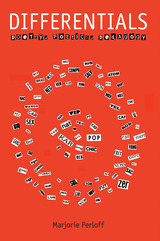
A new collection of essays from a distinguished critic of contemporary poetry
Marjorie Perloff is one of the foremost critics of contemporary American poetry writing today. Her works are credited by many with creating and sustaining new critical interest not only in the work of major modernist poets such as Yeats, Pound, Eliot, and Williams but also in the postwar tradition of American poetic innovation that ranges from the Black Mountain poets, through the New York School and concrete poetry, to the Language Poets of the 1980s and '90s.
In Differentials, Perloff explores and defends her belief in the power of close reading, a strategy often maligned as reactionary in today's critical climate but which, when construed differentially, is vital, she believes, to any true understanding of a literary or poetic work, irrespective of how traditional or experimental it is. Perloff also examines key issues in modernism, from Eliot's conservative poetics and Pound's nominalism to translation theory (Wittgenstein, Eugene Jolas, Haroldo de Campos), and the contemporary avant garde, as represented by writers like Susan Howe, Tom Raworth, Rae Armantrout, Ron Silliman, Ronald Johnson, Caroline Bergvall, and Kenneth Goldsmith.
Ultimately, Perloff's most important offerings in Differentials are her remarkably original reflections on the aesthetic process: on how poetry works, and what it means, in and for our time.

This collection of essays focuses on teaching at the intersection of early modern literature, book history, and digital media. It considers how teaching different fields and methods of study can be enhanced and facilitated by digital technologies. The volume provides a snapshot of current thinking on digital pedagogy as practiced by leading scholars in the field and offers a series of models that may be adapted, personalized, and repurposed by future teachers seeking to bring digital methodologies to their classrooms. Supplementary materials for this title are available on the Iter Press website (iterpress.org): see under Books/Supplementary Materials.
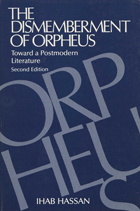
In this book, the first edition of which was published in 1971 by Oxford University Press, Ihab Hassan takes Orphic dismemberment and regeneration as his metaphor for a radical crisis in art and language, culture and consciousness, which prefigures postmodern literature. The modern Orpheus, he writes, “sings on a lyre without strings.” Thus, his sensitive critique traces a hypothetical line from Sade through four modern authors—Hemingway, Kafka, Genet, and Beckett—to a literature still to come. But the line also breaks into two Interludes, one concerning ’Pataphysics, Dada, and Surrealism, and the other concerning Existentialism and Aliterature.
Combining literary history, brief biography, and critical analysis, Hassan surrounds these authors with a complement of avant-garde writers whose works also foreshadow the postmodern temper. These include Jarry, Apollinaire, Tzara, Breton, Sartre, Camus, Nathalie Sarraute, Robbe-Grillet, and in America, Cage, Salinger, Ginsberg, Barth, and Burroughs. Hassan takes account also of related contemporary developments in art, music, and philosophy, and of many works of literary theory and criticism.
For this new edition, Hassan has added a new preface and postface on the developing character of postmodernism, a concept which has gained currency since the first edition of this work, and which he himself has done much to theorize.
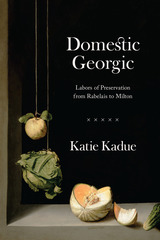
When is literary production more menial than inspired, more like housework than heroics of the mind? In this revisionist study, Katie Kadue shows that some of the authors we credit with groundbreaking literary feats—including Michel de Montaigne and John Milton—conceived of their writing in surprisingly modest and domestic terms. In contrast to the monumental ambitions associated with the literature of the age, and picking up an undercurrent of Virgil’s Georgics, poetic labor of the Renaissance emerges here as often aligned with so-called women’s work. Kadue reveals how male authors’ engagements with a feminized georgic mode became central to their conceptions of what literature is and could be. This other georgic strain in literature shared the same primary concern as housekeeping: the necessity of constant, almost invisible labor to keep the things of the world intact. Domestic Georgic brings into focus a conception of literary—as well as scholarly and critical—labor not as a striving for originality and fame but as a form of maintenance work that aims at preserving individual and collective life.
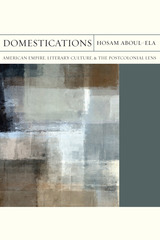
Domestications traces a genealogy of American global engagement with the Global South since World War II. Hosam Aboul-Ela reads American writers contrapuntally against intellectuals from the Global South in their common—yet ideologically divergent—concerns with hegemony, world domination, and uneven development. Using Edward Said’s Culture and Imperialism as a model, Aboul-Ela explores the nature of U.S. imperialism’s relationship to literary culture through an exploration of five key terms from the postcolonial bibliography: novel, idea, perspective, gender, and space.
Within this framework the book examines juxtapositions including that of Paul Bowles’s Morocco with North African intellectuals’ critique of Orientalism, the global treatment of Vietnamese liberation movements with the American narrative of personal trauma in the novels of Tim O’Brien and Hollywood film, and the war on terror’s philosophical idealism with Korean and post-Arab nationalist materialist archival fiction.
Domestications departs from other recent studies of world literature in its emphases not only on U.S. imperialism but also on intellectuals working in the Global South and writing in languages other than English and French. Although rooted in comparative literature, its readings address issues of key concern to scholars in American studies, postcolonial studies, literary theory, and Middle Eastern studies.

Nadine Gordimer has written of J. M. Coetzee that his ‘vision goes to the nerve-centre of being. What he finds there is more than most people will ever know about themselves, and he conveys it with a brilliant writer’s mastery of tension and elegance.’ Doubling the Point takes us to the center of that vision. These essays and interviews, documenting Coetzee’s longtime engagement with his own culture, and with modern culture in general, constitute a literary autobiography of striking intellectual, moral, and political force.
Centrally concerned with the form and content of fiction. Doubling the Point provides rigorous insight into the significance of certain writers (particularly modernists such as Kafka, Musil, and Beckett), the value of intellectual movements (from structuralism and structural linguistics on through deconstruction), and the issues of political involvement and responsibility—not only for Coetzee’s own work, but for fiction writing in general. In interviews prefacing each section of the book, Coetzee reflects on the essays to follow and relates them to his life and work. In these interviews editor David Attwell, remarkably well attuned to his subject, prompts from Coetzee answers of extraordinary depth and interest.
The result is the story of a fiction writer’s intellectual development, and of an intellectual’s literary development. It is the story of how one writer has moved through the scholarly and political trends of the last thirty years, carefully assessing their applications and limitations, and through this experience forged for himself a unique and powerful literary voice informed in equal parts by life and learning.
READERS
Browse our collection.
PUBLISHERS
See BiblioVault's publisher services.
STUDENT SERVICES
Files for college accessibility offices.
UChicago Accessibility Resources
home | accessibility | search | about | contact us
BiblioVault ® 2001 - 2024
The University of Chicago Press









